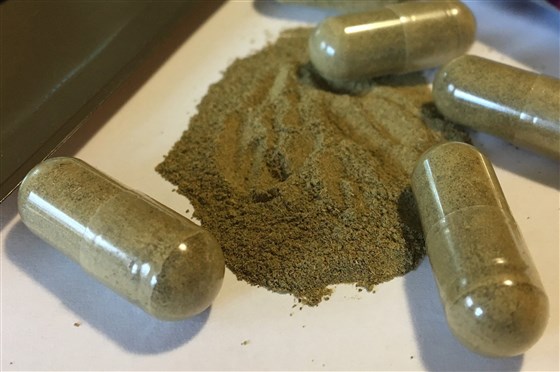Some advocates credit the supplement with getting them off opioids, but as the supplement has surged in popularity in the U.S., safety concerns have prompted the Food and Drug Administration to warn consumers against kratom use.
Bobby DiBernardo credits the herbal supplement kratom with getting him off heroin, oxycodone and alcohol six years ago.
“It saved my life,” he said. “I could have died any day from a heroin overdose and kratom gave me a new lease. It helped take away the pain of withdrawal.”
DiBernardo, 41, of Rochester, New York, still mixes a teaspoon of the herbal powder into a glass of water once or twice a day and drinks it even though he says it tastes terrible.
He is just one of the millions of Americans — potentially upwards of 15 million, according to estimates from the American Kratom Association (AKA) — to use kratom, a supplement made from the leaves of the Mitragyna speciosa tree native to Southeast Asia. Since at least the 19th century, the leaves have been either chewed or brewed in tea by people in Thailand, Malaysia and Indonesia to relieve pain, ease fatigue and boost mood. Kratom is believed to act like a stimulant at lower doses and have opioid-like painkilling effects and sedative properties at higher doses.
But as the supplement has surged in popularity in the U.S., safety concerns have prompted the Food and Drug Administration to warn consumers against kratom use and to crack down on companies making fraudulent health claims.
“We have issued numerous warnings about the serious risks associated with the use of kratom, including warnings about the contamination of kratom products with high rates of salmonella that put people using kratom products at risk, and resulted in numerous illnesses and recalls. Despite our warnings, companies continue to sell this dangerous product and make deceptive medical claims that are not backed by science or any reliable scientific evidence.”
acting FDA Commissioner Dr. Ned Sharpless said in a June 2019 statement, when the agency issued warning letters to two companies selling kratom.
Six states – Alabama, Arkansas, Indiana, Rhode Island, Vermont and Wisconsin – and the District of Columbia have even taken the step of banning the supplement.
That’s a move that kratom advocates, including Lois Gilpin, 58, of Louisville, Kentucky, oppose.Gilpin has been mixing kratom powder into her orange juice about two or three times a day for four years and says it relieves the chronic pain in her left leg and back so well that she can now get out of bed and enjoy her family again. “It’s definitely not a fix-all,” Gilpin said. “But for it to work well enough that I’m able to pick up my granddaughters from school and take them to the park is huge.”
She was so impressed with kratom that she began volunteering her time to coordinate the social media efforts of the AKA, a consumer advocacy group in Virginia that was founded in 2014.
So, is kratom really all it’s cracked up to be? Or is more caution needed?
Is there solid evidence that kratom is beneficial?
Up until now, there haven’t been made any rigorous studies in order for this drug, to be FDA approved, just like with any other drug.
Grundmann also mentioned that rigorous “gold standard” is not required before dietary supplements can be sold; instead, “what we have primarily are the beneficial uses that have been reported in a traditional setting in East Asia, and surveys and user reports in the U.S. and Europe”.
In his survey, the most commonly reported benefits of kratom were reduced pain, increased energy and better mood. The majority of respondents reported benefit at doses up to five grams taken up to three times per day.
“I would say that we have relatively good anecdotal emerging evidence that kratom has benefits for the average user as long as we consider how much kratom is being used and what products are being used,” Grundmann said.
But while there may be encouraging anecdotal reports of benefits, some experts are calling for more research.
Source: nbcnews.com










